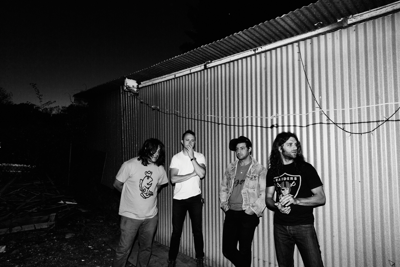
Lee Bains III and the Glory Fires released their most recent album, 2017’s epic 17-track Youth Detention, right in the thick of the first year of Trump’s presidency. Along with other albums released around the same time — like Hurray for the Riff Raff’s fantastic The Navigator — Youth Detention took stock of the current moment through the lens of its creator’s place of origin (in Bains’ case, Birmingham, Ala.), illuminating macro issues through the lens of the micro.
Almost a year later (Youth Detention was officially released in June 2017), Bains and his band are still touring the album, with a long string of dates — including a stop at The Basement on Wednesday — planned for the coming weeks. The album’s songs turn an unflinching eye on white supremacy, structural racism and the complicated legacy of the South. The relevance of the conversation has not diminished. About six weeks after Youth Detention’s release, a young woman, Heather Heyer, was killed at the Unite the Right white supremacist rally in Charlottesville, Va. A few weeks before my conversation with Bains, ICE raided a meatpacking plant in Bean Station, Tenn., about an hour outside of Knoxville, arresting 97 immigrants who worked at the facility.
“I wrote those songs to myself as much, if not more, than to other folks, so [the issues] actually become, I guess I would say, more and more apparent in the world, and more and more divisive amongst people,” says Bains. “It’s actually like playing those songs over and over again can kind of create a space for me that feels empowering and enabling. It opens me up.”
Any fan of Bains knows he’s never shied away from social commentary. Dereconstructed, Bains’ 2014 album with the Glory Fires, is exactly what it sounds like: a complex, punk-infused meditation on what it means to be a progressive Southerner grappling with the region’s bloody, racist history. It was only natural that Bains would return to similar territory on Youth Detention, though his writing on the latest record is even more urgent. As he grappled with current events while making the record, Bains turned to literature for guidance. He found the work of activist and scholar Angela Davis particularly resonant.
“Angela Davis was a big influence on this record and the way I think about things,” says Bains. “I was reading a speech of hers that she turned into an essay [‘Freedom Is a Constant Struggle’], and she was talking about the role of art in activism and liberatory movements, and she was saying that she thought that art was important because it helped us to envision a reality that is not immediately apparent, and it helped us to see a future that was possible. She said it helps her to visualize a future where we’re all free. That’s what I was hoping to do with that record, to confront reality as it is, but also emphasize these moments of freedom and of transcendence that we’re surrounded by all the time.”
That sentiment is embodied throughout the album, but nowhere more powerfully (or literally) than on album closer “Save My Life!,” in which Bains declares: “Don’t you tell me / ‘It’s only rock ’n’ roll’ / When I’ve seen it wrestle truths from noise.” Wrestling with the truth is a theme of Youth Detention. “Whitewash” considers the intersection of structural racism and gentrification, where relentless development has the potential to hide the misdeeds of the past behind “continental cafes and unblinking empire.” The refrain of “Black & White Boys” is a rallying cry to do what you know is right, even if you’re being told to do something else: “God save us / Black and white boys / Eat up with the borderlines / God save us / Black and white boys / Washed out in stoic Southern sunshine.”
That Bean Station ICE raid, which was covered widely in the national press, particularly touched a nerve with Bains, who frequently finds himself perplexed by the discrepancies between people’s political beliefs and the ways in which they actually lead their lives.
“A lot of times, I’ve known people whose personal morality doesn’t square with their politics,” he says. He illustrates his point with the story of a childhood friend who would crack racist jokes in casual conversation, but made sure his playmates in his majority-black neighborhood always had a place to eat a warm meal.
Youth Detention finds its power in the intersection of Bains’ vulnerability about his home’s complicated legacy and his optimism about its future. The album attempts to show that the gap between the personal and the political, though still difficult to bridge, is really the only thing that separates us from our neighbors.
“The challenge to me is how do we square the personal and the political?” says Bains. “In the South particularly, at least where I grew up, I was always told, ‘Never talk about politics, sex or religion.’ But I think that reticence to talk about this stuff makes it much easier for folks to maintain that dissonance, because we aren’t confronting each other on it. I think that’s an important part of growth: reckoning with our failures and our flaws.”





